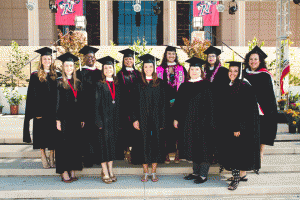CSUN Master of Social Work Online Program Garners Top Ranking

Spring 2015 graduates of the Masters of Social Work online program. Photo courtesy of Rachel Navarro.
California State University, Northridge’s online Master of Social Work (MSW) program has been ranked No. 1 by the online platform graduatestudents.com.
CSUN established its Department of Social Work in 2005. The online component of the MSW program started in 2011 and is a fully accredited two-year master’s program, with the same curriculum as the face-to-face program.
“We’re a really young program, so this is an exciting place to be,” said Jodi Brown, director of the online program.
“Part of the reason that Northridge’s online programs are being recognized and ranked is that Northridge takes a different approach to online education,” said Joyce Feucht-Haviar, university senior international officer and dean of the Tseng College. “We keep going back and refining it and adding to it. It’s an ongoing and continuous improvement.”
Feucht-Haviar said the online courses are designed by faculty, as well as instructional designers with backgrounds in technology and computer science. The instructional designers advise faculty members on different ways to interact, converse, and offer demonstrations and simulations with the available technology.
“The instructional designers can help the faculty member find the right technical tools and instructional strategy,” Feucht-Haviar said. “We’ve been able to make the most out of the tools that are available online.”
Rachel Navarro, program coordinator of the online cohort, said online classes offer more flexibility for students’ schedules. However, they still need to keep up with the class schedule, which makes the online program just as rigorous as its face-to-face counterpart, she said. Brown agreed.
“There is a perception out there in online education that the degree is not as meaningful as a traditional, face-to-face degree,” Brown said. “But our students are not experiencing this at all.”
“You’re studying with the same faculty that teach the program on campus, which is not always the case with some providers,” Feucht-Haviar added. “The program has the same accreditation, academic standards and faculty as if you would take it on campus.”
Despite the accolades, MSW program staff are not resting on their laurels. Brown and Navarro said they see potential for improvement — particularly on the social aspects of the program.
“There is always room for improvement, and we’re always trying to improve,” Brown said. “In an online environment, it can be pretty lonely. You’re not necessarily having that initial engagement. It is difficult to build a community online.”
To accommodate students socially in the online environment, MSW program staff implemented a social hub for students to share information or to write about frustrations, excitement and expectations.
“To develop that and have that grow ends up creating a sense of community,” Brown said. “We’re looking for more ways to grow that community. Our cohort model is really important, in terms of students feeling supported.”
The latest feature, which was just implemented this semester, is a series of town hall-style sessions, giving students opportunities to talk to the instructors about issues, or give them feedback or suggestions on the class. The main goal of the town hall sessions is to support students and show them that the administration and faculty care about them.
“It’s things like that that we’re trying to build, develop and grow,” Brown said. “That cohort piece and that community piece is what really makes us No. 1 and makes students appreciate what they get from our program.”
According to Brown, more than 95 percent of the registered students graduate from the online MSW program, which is a remarkable number in online education.
“One of the things you often hear about online education is that only 10 percent of students actually finish the course, and that’s not true for us,” Brown said.
In addition to the academic online classes, students also obtain field internships at social agencies within their local communities, such as hospitals, schools and other community organizations. Most agencies initially expressed doubts about online students, but they quickly acknowledged the students’ potential after working with them, Brown said.
“We’re changing the perspective [about] online education by the strengths of our students and their roles as interns and in their field placements,” Brown said. “Agencies are no longer looking at online students as less than the face-to-face students. They are looking at them as equal or even better than some of the other programs out there, which I think is just fabulous.”
Graduatestudents.com based their rankings on 15 different categories, ranked by alumni and current students. The highest-rated categories of the online MSW were academic competitiveness, education quality, grad student value, use of technology, student diversity, and faculty accessibility and support.
“We would love to stay No. 1 from a student perception — I think that matters,” Brown said.
“The real quality of any program is the faculty who teach it and their sense of commitment to the field, whether you’re doing it face to face or online,” Feucht-Haviar added. “It’s care for the students and the field. It’s a passion.”

 experience
experience